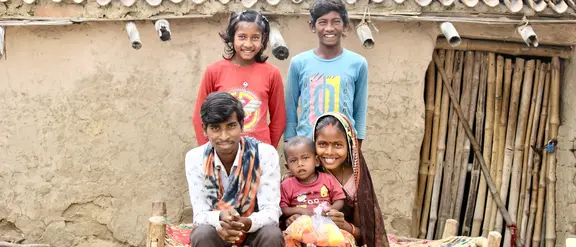India: Education instead of child labor
The quarries stretch across the landscape like lunar craters. Explosions can be heard constantly. Dust hangs in the air, covering paths and fields. Twelve-year-old Guddu lives with his family in this surreal environment.
Guddu's home village of Madachak is one of many in the Mirzapur district of eastern India where sandstone is quarried on a large scale. Large blocks of stone are blasted from the rock, broken up with pickaxes, and loaded onto trucks. The people, who often work here without protective equipment, depend on the low wages paid by the mine operators. If the money isn't enough, the whole family has to pitch in. As a result, children rarely or never attend school.
But Guddu has succeeded: At the Terre des Hommes children's center, he can catch up on the schoolwork he has missed. And here, he is learning alongside other children that a school diploma opens doors to a professional future outside the mines. Together with its local partner organizations and the German aid organization Misereor Terre des Hommes aims to sustainably improve the situation of families in six mining regions across India. To reduce people's long-term economic dependence on the mines, the project focuses primarily on education and awareness. The children and their families are empowered to stand up for their rights. For example, the children's center offers workshops where the children learn about these rights.
The girls and boys are also taking action themselves: "We visit the parents at home and try to convince them to send their children to school," reports Guddu. He himself is the best example for other families. The adults are also becoming bolder and getting involved: They are addressing grievances with the local government and joining forces with the mine operators to demand helmets and protective masks against the dust in the mines.
Through the project, many families also learn that they are entitled to government support and how to apply for it. There are special support programs to help the mine workers and their families. With the money provided, parents can send their children to school without facing financial hardship. Thanks to these programs, Guddu's eldest sister was able to train as a seamstress. Her mother proudly says, "She now earns enough for herself and can even support the family financially." Guddu, too, continues to work diligently toward realizing his dream of a dust-free life: "I'm now focusing entirely on school!"
